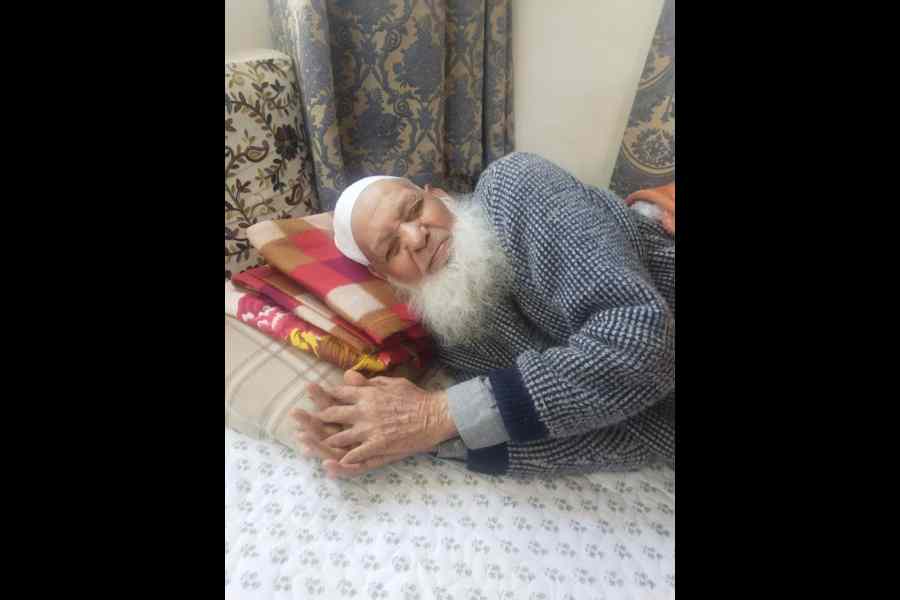The former chief of the banned Jamaat-e-Islami, Sheikh Ghulam Hassan, said his party should not have contested the Jammu and Kashmir elections, claiming he was "informed" by the leadership about the decision to fight but was "not consulted".
Taking digs at militancy, the senior leader of the outfit said it “does not solve any issue”, adding that the Jamaat constitution does not support any “underground activity”.
Jamaat is believed to have initially opposed militancy but later taken a lead role in it by forming the Hizbul Mujahideen, Kashmir’s oldest surviving militant group, in 1990.
In the initial years, all top Hizb leaders had a Jamaat background. The militant outfit even declared itself as the military arm of the Jamaat with the latter acknowledging it too. The group formally delinked itself from the Hizb in 1997 in the face of killings by counter-insurgency group Ikhwaan. The allegations of separation from the Hizb never subsided.
In an interview with The Telegraph, Hassan, 88, who headed Jamaat between 2006 and 2012 but is ailing and bed-ridden now, suggested that the decision to support militancy was taken under duress. He spoke in hushed tones because of his health.
“The Jamaat constitution is clear that there should be no underground activity. It (whatever happens) should happen openly. That is why I was against it. All (big leaders) were against it but they (Hizb) made an announcement. We could not deny but when the situation improved, the then amir of Jamaat (Ghulam Hassan Bhat in 1997) announced we have no militant outfit,” he said.
Hassan acknowledged that several senior leaders backed militancy. His eldest son, Sheikh Iqbal, was also a militant who was killed in 1992. The family said his decision to join militancy was his own and he never sought permission from his father.
“We learnt after a month that he has joined militancy,” a family member said.
On how could his party contest the elections when Jamaat and Hizb are accused of killing political opponents, Hassan said he was not aware of such killings. At the same time, he said killing innocents was wrong.
On elections, Hassan said he was not consulted by the current leadership headed by Ghulam Qadir Wani. “Jamaat is a banned organisation. It (decision to contest) should not have happened,” he said, parrying questions over whether it was a right or wrong decision.
“It has already happened,” Hassan said.
His family said he had been away from all organisational activities for the last one year because of his deteriorating health.
Jamaat is informally contesting its first election since the outbreak of militancy in 1989. It has attracted allegations of being a “BJP proxy”, allowed to contest to help queer the pitch for the INDIA bloc of anti-BJP parties.
Its decision has created quite a buzz as several militant groups, Hizb in particular, have killed hundreds of political activists belonging mainly to the National Conference and other parties, including the CPM.
Rivals are raising questions over the dramatic U-turn and asking how a haraam (forbidden) thing has suddenly become halaal (lawful).
More intriguing is the BJP-led government's decision to allow the Jamaat to contest. Before militancy, the Jamaat had participated in the elections, although it batted for the "right to self-determination".
Senior Jamaat activists in south Kashmir said they had directions from the party not to boycott polls.
Hassan contested the 1983 Assembly elections from Kulgam but lost to the National Conference. The party won the elections in 1987 as part of Muslim United Front, a grouping that had challenged the National Conference-Congress alliance.
The election was rigged at some places and is believed to have partly contributed to the rise of militancy.
While the Jamaat formally stayed away from polls in the last three-and-a-half decades, the party is widely known to have supported the Peoples Democratic Party in the elections. The former amir, however, denied any association with the PDP.











